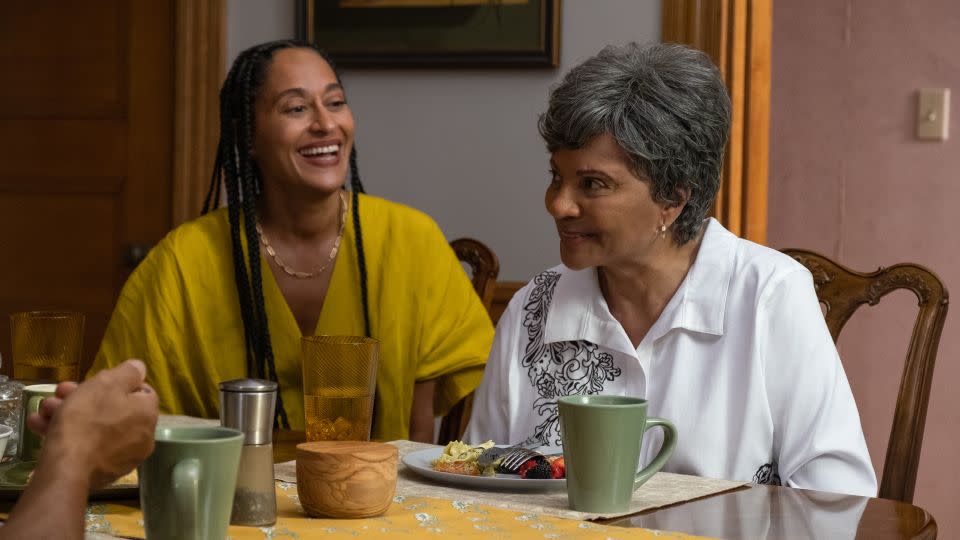Opinion: The slow burns in this movie are a wonder to behold
- Oops!Something went wrong.Please try again later.
- Oops!Something went wrong.Please try again later.
- Oops!Something went wrong.Please try again later.
Editor’s Note: Gene Seymour is a critic who has written about music, movies and culture for The New York Times, Newsday, Entertainment Weekly and The Washington Post. Follow him on X @GeneSeymour. The opinions expressed in this commentary are solely those of the author. View more opinion on CNN.
Books are books and movies are movies, and there are some things books can do that movies can’t — and vice versa.

One thing the movies don’t do much is make thrilling features about people who write books for a living — unless, as with Kathleen Turner’s romance novelist in 1984’s “Romancing the Stone,” they’re running from bad guys in exotic locales.
So, consider “American Fiction,” for starters, as a different, if no less daring leap into adventure — a high-wire act, risking contempt, indifference or box-office failure. Industry pundits have higher hopes for the movie, which has gotten two Golden Globe nominations, Oscar buzz and much critical acclaim.
The movie’s protagonist is kind of a critic’s darling, too. Thelonious “Monk” Ellison (Jeffrey Wright) writes the kinds of books that are artful, intelligent, maybe even innovative, but don’t make a lot of money. Being an African American, Ellison is constantly told that the reason his books don’t sell, or even get published, is because they’re not “Black enough.”

Thus, Ellison earns most of his living as a college professor. He refuses to compromise his integrity by writing what publishers and the public expect from him.
He’s also uncompromising as a teacher: When he teaches a class in Flannery O’Connor’s short story, “The Artificial N—-r,” one of his White students insists he removes the n-word because seeing it disturbs her. He curtly tells her that he’s heard that word hurled at him abusively for most of his life. “If I can get over it,” he says to her, “you can, too.” She leaves the classroom in tears. His bosses encourage him to take time off.
That’s at the very start of “American Fiction,” adapted by first-time feature director Cord Jefferson from Percival Everett’s 2001 novel, “Erasure.” Already you can see how Jefferson, who made his reputation writing scripts for such edgy TV series as “The Good Place,” “Watchmen” and “Station Eleven,” is stirring the pot and daring his audience to understand too quickly what the movie is up to. “Oh, so it’s supposed to be an attack on political correctness, right?”

Not even close. Ellison’s time-out from teaching is, saying the least, fraught. His sister (Tracee Ellis Ross), a doctor, dies suddenly just as their mother (Leslie Uggams) is showing signs of dementia. He needs more money than whatever his published books are earning.
How to get it? Maybe by being … Black Enough? At least as Black, anyway, as “We’s Lives In Da Ghetto,” a novel about impoverished Black life written in “street” patois by Sintara Golden (Issa Rae) that’s become a best-selling phenomenon.
Ellison seethes. (Wright’s masterfully orchestrated slow burns are wonders to behold.) But his financial straits force him himself to write “My Pafology,” under the pseudonym, “Stagg R. Leigh.” The movie shows him at his desk pounding out a saga of thugs and drugs and dysfunction so hackneyed that it’s practically a parody. Not altogether to his surprise, his agent (John Ortiz) tells him they have a surefire hit on their hands. White publishers and publicists swoon over what they see as “My Pafology’s” tell-it-like-it-is authenticity.
Meanwhile, life as Ellison’s really living it goes on as he struggles to convince his mother she needs full-time care while trying to reconcile with his estranged brother (Sterling K. Brown) and kindle a romance with a charming lawyer (Erika Alexander), who’s moved into the Massachusetts beach house across from his family’s.

Such is the core tension “American Fiction” cunningly sets up: the contrast between the faux underclass-ghetto kabuki Ellison’s successfully peddling and the very real and often poignant interpersonal relationships of his personal life.
The movie’s satiric arc, with its broad depictions of White editors and show-biz types grooving on Stagg R. Leigh’s street cred, is nicely handled as is the crafty depiction of “My Pafology’s” characters (Keith David, Okieriete Onaodowan) acting out Ellison’s melodramatic scenes as he writes them and at times staring back at their creator with incredulity.
The scenes with Ellison and his family and friends have their own softer-edged humor. You wonder, as I’m sure Ellison might, whether all those White people who dig “My Pafology’s” street-life junk would be even a little bit intrigued, say, by the backstory of Maynard (Raymond Anthony), the small-town Black cop who becomes sweet on Lorraine (Myra Lucretia Taylor), the Ellison’s family housekeeper.
These days, I suspect, the space for expanding such stories, even those told by and about people like Thelonious Ellison, has been widened since Everett wrote “Erasure” near the turn of this century. The post-George Floyd universe, in its struggle to reevaluate hidebound presumptions about Black people’s humanity, seems, for the time being, to have short-circuited the most overt impulses to stereotype African American behavior. Or “understand” it too quickly.
In a strange way, “American Fiction,” by its very existence, seems to have rendered what it’s satirizing almost obsolete. There are plenty of novels, many of them published this year, including “The Survivalists,” Kashana Cauley’s sardonic comedy-of-manners, “Crook Manifesto,” Colson Whitehead’s 70s-era crime saga, and “Liquid Snakes,” Stephen Kearse’s darkly-humorous science-fiction, that offer varied depictions of Black American life, past and present. If this movie does make an impression with audiences (and Oscar voters) maybe some of those books will be mined by Hollywood for their own big-screen close-ups.
If you don’t expect too much. After all, movies are movies while books … and this is where we came in.
For more CNN news and newsletters create an account at CNN.com

